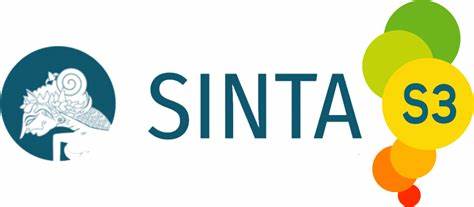THE EFFECT OF PEER FEEDBACK ON ENGLISH WRITING SKILLS AMONG EFL STUDENTS
Abstract
This study investigates the role of peer feedback in enhancing the English writing skills of EFL students using a quantitative approach with a one-group pre-test post-test design. Twenty students from SMK Muhammadiyah Mataram participated in paragraph writing tasks assessed in grammar, vocabulary, and coherence. Peer feedback activities were structured and integrated with AI tools to support revision. Data were collected using test and analyzed using SPSS. The results demonstrated a statistically significant improvement in students' writing performance, with the average score rising from 53.42 to 85.89 (p < 0.05). The greatest gains were seen in grammatical accuracy and vocabulary development. Despite initial challenges such as fear of criticism and limited peer review skills, students showed increased awareness of their writing errors and benefited from collaborative learning. This study confirms that peer feedback, when guided and supported by technological tools, effectively enhances writing quality, fosters self-reflection, and builds confidence. The findings suggest that peer feedback can be a practical pedagogical tool to support EFL writing instruction.
References
Bahrain, N. K., Sakrani, S. R., & Maidin, A. (2023). Communication barriers in work environment: understanding impact and challenges. International Journal of Academic Research in Business and Social Sciences, 13(11), 1489-1503. https://doi.org/10.6007/ijarbss/v13-i11/19498.
Bean, J. C., & Melzer, D. (2021). Engaging ideas: The professor's guide to integrating writing, critical thinking, and active learning in the classroom. John Wiley & Sons.
Moore, C., & Teather, S. (2013). Engaging students in peer review: Feedback as learning. Issues in Educational Research, 23(2), 196-211.
Cao, S., Zhou, S., Luo, Y., Wang, T., Zhou, T., & Xu, Y. (2022). A review of the ESL/EFL learners’ gains from online peer feedback on English writing. Frontiers in Psychology, 13, 1035803. https://doi.org/10.3389/fpsyg.2022.1035803.
Challob, A. I. (2021). The effect of flipped learning on EFL students’ writing performance, autonomy, and motivation. Education and Information Technologies, 26(4), 3743-3769. https://doi.org/10.1007/s10639-021-10434-1.
Chen, M., & Cui, Y. (2022). The effects of AWE and peer feedback on cohesion and coherence in continuation writing. Journal of Second Language Writing, 57, 100915. https://doi.org/10.1016/j.jslw.2022.100915.
Cui, Y., Schunn, C. D., Gai, X., Jiang, Y., & Wang, Z. (2021). Effects of trained peer vs. teacher feedback on EFL students’ writing performance, self-efficacy, and internalization of motivation. Frontiers in psychology, 12, 788474. https://doi.org/10.3389/fpsyg.2021.788474.
Cui, Y., Schunn, C. D., & Gai, X. (2022). Peer feedback and teacher feedback: a comparative study of revision effectiveness in writing instruction for EFL learners. Higher Education Research & Development, 41(6), 1838-1854. https://doi.org/10.1080/07294360.2021.1969541.
Geng, F., Yu, S., Liu, C., & Liu, Z. (2022). Teaching and learning writing in English as a foreign language (EFL) school education contexts: A thematic review. Scandinavian Journal of Educational Research, 66(3), 491-504. https://doi.org/10.1080/00313831.2021.1897872.
Ghaffar, M. A., Khairallah, M., & Salloum, S. (2020). Co-constructed rubrics and assessment for learning: The impact on middle school students’ attitudes and writing skills. Assessing Writing, 45, 100468. https://doi.org/10.1016/j.asw.2020.100468.
Larsen‐Freeman, D., Kuehn, T. and Haccius, M. (2002) ‘Helping Students Make Appropriate English Verb Tense‐Aspect Choices’, TESOL Journal, 11(4). https://doi.org/10.1002/j.1949-3533.2002.tb00102.x.
Latifi, S., Noroozi, O., & Talaee, E. (2023). Worked example or scripting? Fostering students’ online argumentative peer feedback, essay writing and learning. Interactive Learning Environments, 31(2), 655-669. https://doi.org/10.1080/10494820.2020.1799032.
Onanuga, P. A., Ifamuyıwa, A., & Alebiosu, K. (2021). Constructivist-Based Learning on Students Psycho-Productive Skills Performance in Agricultural Science. International Journal of Educational Research Review, 6(3), 283-297. https://doi.org/10.24331/ijere.943443.
Shaddad, A.R.E, & Jember, B. (2024). A step toward effective language learning: an insight into the impacts of feedback-supported tasks and peer-work activities on learners’ engagement, self-esteem, and language growth. Asian-Pacific Journal of Second and Foreign Language Education, 9(1), 39.Available at: https://doi.org/10.1186/s40862-024-00261-5.
Shintani, N., Ellis, R., & Suzuki, W. (2014). Effects of written feedback and revision on learners’ accuracy in using two English grammatical structures. Language learning, 64(1), 103-131. https://doi.org/10.1111/lang.12029.
Shivaraju, P. T., Manu, G., Vinaya, M., & Savkar, M. K. (2017). Evaluating the effectiveness of pre-and post-test model of learning in a medical school. National Journal of Physiology, Pharmacy and Pharmacology, 7(9), 947. https://doi.org/10.5455/njppp.2017.7.0412802052017.
Siegel-Stechler, K. (2023). “Conversation is everything”: How teachers and students create environments where open discussion can thrive. Theory & Research in Social Education, 51(4), 626-660. https://doi.org/10.1080/00933104.2023.2219638.
Sriyanti, I., Almafie, M. R., Marlina, L., & Jauhari, J. (2020). The effect of using flipbook-based e-modules on student learning outcomes. Kasuari: Physics Education Journal (KPEJ), 3(2), 69-75. https://doi.org/10.37891/kpej.v3i2.156.
Sun, Q., Zhang, L. J., & Carter, S. (2021). Investigating students' metacognitive experiences: insights from the English as a foreign language Learners' writing metacognitive experiences questionnaire (EFLLWMEQ). Frontiers in Psychology, 12, 744842. https://doi.org/10.3389/fpsyg.2021.744842.
Tang, K. H. D. (2023). Student-centered approach in teaching and learning: What does it really mean?. Acta Pedagogia Asiana, 2(2), 72-83. https://doi.org/10.53623/apga.v2i2.218.
Uludag, P., & McDonough, K. (2022). Validating a rubric for assessing integrated writing in an EAP context. Assessing Writing, 52, 100609. https://doi.org/10.1016/j.asw.2022.100609.
Vuogan, A., & Li, S. (2023). Examining the effectiveness of peer feedback in second language writing: A meta‐analysis. Tesol Quarterly, 57(4), 1115-1138. https://doi.org/10.1002/tesq.3178.
Weaver, B. and Maxwell, H. (2014) ‘Exploratory factor analysis and reliability analysis with missing data: A simple method for SPSS users’, The Quantitative Methods for Psychology, 10(2). Available at: https://doi.org/10.20982/tqmp.10.2.p143.
Yu, R., & Yang, L. (2021). ESL/EFL learners' responses to teacher written feedback: Reviewing a recent decade of empirical studies. Frontiers in Psychology, 12, 735101. https://doi.org/10.3389/fpsyg.2021.735101.
Yu, S., & Hu, G. (2017). Understanding university students’ peer feedback practices in EFL writing: Insights from a case study. Assessing Writing, 33, 25-35. https://doi.org/10.1016/j.asw.2017.03.004.
Zhang, Y. (2022). Incorporating Peer Response with Teacher Feedback in Teaching Writing to EFL Learners: A Literature Review. English Language Teaching, 15(3), 48-53. https://doi.org/10.5539/elt.v15n3p48.
Downloads
Published
Issue
Section
License

This work is licensed under a Creative Commons Attribution-ShareAlike 4.0 International License.
The author is responsible for acquiring the permission(s) to reproduce any copyrighted figures, tables, data, or text that are being used in the submitted paper. Authors should note that text quotations of more than 250 words from a published or copyrighted work will require grant of permission from the original publisher to reprint. The written permission letter(s) must be submitted together with the manuscript.




